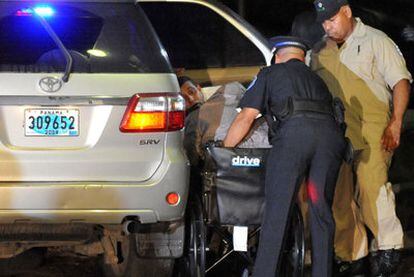Noriega’s family seeks to win his release from a Panamanian prison
Former dictator is sent back home after 22 years in US and French custody
The day after Panama's military dictator of the 1980s, Manuel Noriega, arrived back home after spending the last two decades in US and French prisons, his family began challenging the convictions handed down against him in absentia that could keep him in prison for the rest of his life.
Noriega, 77 and infirm, arrived in Panama City on Sunday night after being flown out of Paris where he was serving a term for money laundering. During a stopover in Madrid where he boarded an Iberia flight to his home country, a small commotion broke out among some passengers after they found out that Noriega was on board.
Noriega, who was toppled during a 1989 US invasion of Panama and taken to Miami where he was convicted later of drug-trafficking charges, had been escorted by police during the trans-Atlantic flight and was taken immediately to the Panamanian jail El Renacer outside the capital. He had already been convicted and sentenced to 20 years in three homicide cases involving 11 murders, including the 1985 beheading of a doctor who threatened to reveal Noriega's drug ties.
Justice Minister Roxana Méndez said Monday that despite his delicate health, he will be treated the same as any other inmate and will have visiting privileges on the weekends like the other prisoners. Lorena Noriega, the dictator's daughter, filed an appeal with the Justice Ministry in an attempt to get her father freed from prison. On Tuesday, Noriega's lawyer, Julio Berrio, met with him for nearly three hours at El Renacer. He avoided reporters' questions after leaving the penitentiary.
As soon as he arrived, the Noriega family announced that they "were jubilant" that he was home. "God's will is good," wrote Thays Noriega, another daughter who works at the Foreign Ministry, on her Twitter account.
The former dictator, who spent 22 years serving time in the United States and France, suffers from hypertension and is limited in his movements after suffering a stroke a few years back.
Meanwhile, the family of a 17-year-old student Rita Wald, who disappeared in 1977 when Panamanian strongman Omar Torrijos was in power, filed a petition with the government demanding that it reopen the investigation. Edwin Wald, the missing student's brother, said that the government should take advantage of Noriega's presence in the country to clear up a lot of cases. Noriega was a top member of Torrijos' inner circle in the 1970s. After Torrijos died in a plane crash in 1981, a subsequent power struggle brought Noriega to power two years later.
Rita Wald, who had opposed the Torrijos regime, disappeared as she left school. In 1999, investigators found the bones of a girl at an army base in Tocumen, but DNA samples showed they were not hers.
Amnesty International has also asked the current Panamanian government of Ricardo Martinelli for an exhaustive investigation into all the crimes committed during Noriega's 1993-89 term in office. "The Panamanian courts owe the victims a full investigation into Noriega's involvement in human rights abuses, which took place for decades," the organization said in a statement.
Among the cases Amnesty International cited were the murder of Hugo Spadafora, a deputy health minister who opposed Noriega, and the execution of General Moisés Giroldi Viera, who tried to lead a coup against him.
In another issue, the Colombian government has asked Panama to extradite María del Pilar Hurtado, the former director of Colombia's intelligence agency DAS, who is wanted on charges of political spying during Álvaro Uribe's past presidency.
The petition was presented on Tuesday.











































